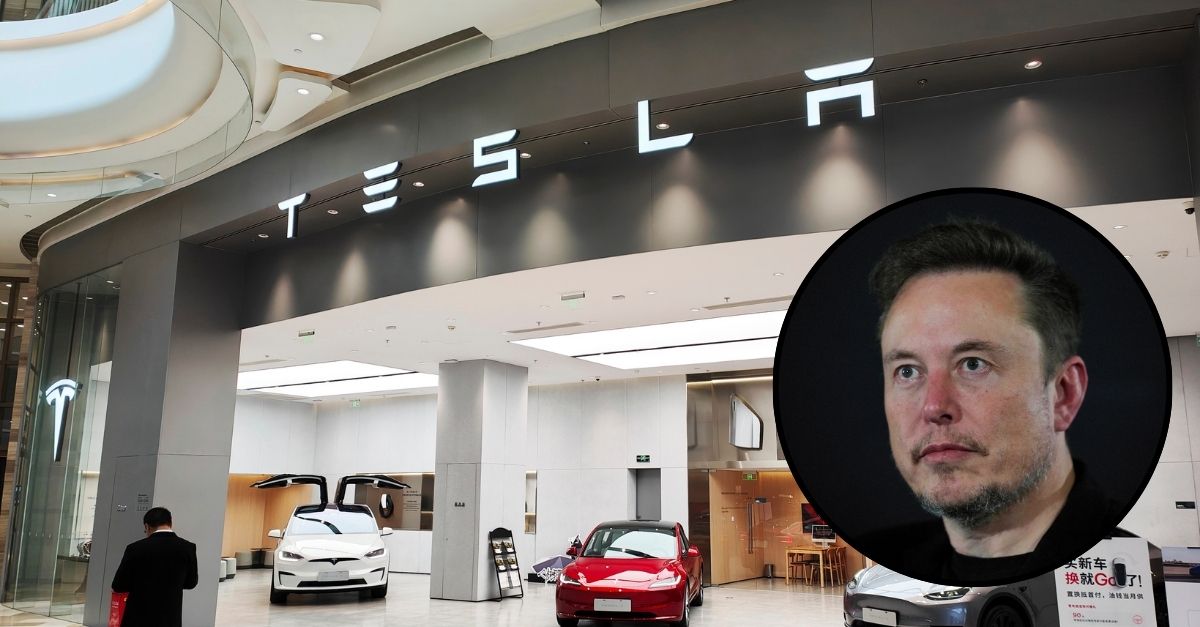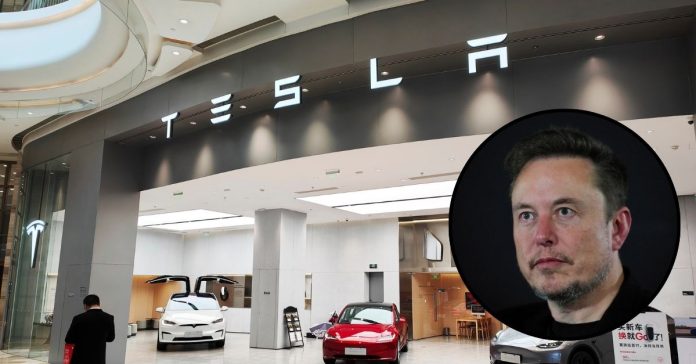
Background: Models of the new energy vehicle series are being displayed at a Tesla store in Shanghai, China, on March 26, 2024. (Photo by Costfoto/NurPhoto via AP). Inset: Tesla and SpaceX’s CEO Elon Musk looks on during an event with Britain’s Prime Minister Rishi Sunak in London, Nov. 2, 2023. (AP Photo/Kirsty Wigglesworth, Pool, File)
Tesla’s attempt to shoo away litigation alleging the company fueled a hostile work environment for its Black employees, including subjecting them to racial slurs and even the placement of nooses in their workspace, was rejected by a federal judge in California.
U.S. District Judge Jaqueline Scott Corley, an appointee of President Joe Biden, issued the decision on March 29, writing over 18 pages that despite Tesla’s “awareness of racial misconduct” it failed to investigate Black employees’ complaints or implement any new policies at its Fremont, California, factory to stop the alleged harassment.
As Law&Crime previously reported, the complaint was filed against the company owned by billionaire Elon Musk by the U.S. Equal Employment Opportunity Commission in September 2023, alleging that degrading language used in high-traffic areas of its Fremont plant created a hostile work environment.
“Non-Black managers and non-Black non-managerial employees and temporary workers alike directly addressed Black employees individually and collectively as N-Words,” the parties alleged last year.
The harassment also included swastika graffiti, nooses being placed in the workspace and retaliation against employees who stood up to supervisors. That retaliation included the changing of schedules, the assignment of arbitrary duties or tasks, or firings once a complaint was lodged by an employee about racist treatment.
Tesla tried to dismiss the claim, saying that the commission had failed to state sufficient facts. But in Corley’s ruling, the judge said the carmaker had missed the mark.
“Without citing any authority, Tesla argues the ‘details’ the Commission provided were insufficient because they failed to ‘include any facts allowing Tesla to understand what problematic practices it purportedly implemented, and what class of employees suffered as a result, beyond potentially every Black employee at the Fremont facility since 2015,’” Corley wrote. “Not so.”
The EEOC is not required to provide Tesla with facts to understand what problematic practices it purportedly implemented nor is it required to define the class of employees. The commission’s job, Corley wrote, is to reconcile claims without having to devote a set amount of time or resources to that end and the commission gave Tesla that chance already.
Tesla felt those discussions were not “meaningful” or in “good faith,” but U.S. Supreme Court precedent confirms that the high court has already expressly rejected “good faith” requirements in pre-litigation conciliation.
To bring a hostile work claim, the parties had to show discrimination on account of their protected group status and that the conduct was so severe it altered the conditions of employment.
The use of the “N word” as a slur against Black people clearly met that bar and then some, Corley explained, citing a 2004 hostile workplace case where the court found that “perhaps no single act can more quickly alter the conditions of employment and create an abusive working environment than the use of an unambiguously racial epithet [such as the N-word] by a supervisor in the presence of his subordinates.”
The allegations brought by the plaintiffs highlighted that Tesla had been “permeated” with this sort of discrimination.
“The Commission’s factual allegations are sufficient to support the inference the alleged racial harassment was sufficiently severe to pollute Tesla’s Fremont Factory and create an abusive workplace for Black employees,” Corley wrote.
Attorneys for Tesla and the EEOC did not immediately respond to a request for comment Monday.
Per the judge’s order, an initial case management conference will be held via Zoom on May 9.
Have a tip we should know? [email protected]

